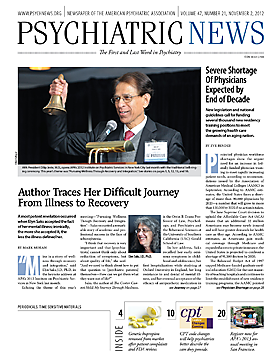The social and health effects of income inequality—including mental illness—tend to be worse in more-unequal countries, and the United States is the most unequal of all, maintains Richard Wilkinson, M.Med.
Those problems are independent of gross national product per capita in the world’s industrialized democracies, he said.
In fact, the findings of Wilkinson and his colleagues echo across all realms of personal and public health, he said at APA’s 2012 Institute on Psychiatric Services in New York last month.
“Life expectancy is not related to national income per capita between countries, but does track income differences within rich societies,” he said.
Wilkinson defines income inequality “as the ratio of the total annual household income received by the richest 20 percent of the population to that received by the poorest 20 percent.” In a study he published in 2007, this ratio ranged from 3.4 in Japan, the most equal country, to 8.55 in the United States, the most unequal.
The factors that Wilkinson used to test his model include life expectancy, literacy, infant mortality, homicides, imprisonment, teenage births, trust, mental illness (including substance addiction), and social mobility.
“Furthermore, these problems are common across societies, not just among the poor,” said Wilkinson, a professor emeritus of social epidemiology at Britain’s University of Nottingham Medical School. He reported many years of research findings in the book The Spirit Level (Bloomsbury Press, 2009), written with Kate Pickett.
Mental illness appears to follow the same trend.
“The U.S. reports the highest level of inequality and the highest rates of mental illness,” he said.
An exception is suicide, he added. “Suicide is more common in more-equal countries, despite the rates for depression being the other way around.” he pointed out.
Ironically, during what is now seen by some as a golden age in American social and economic history—roughly 1940 to 1980—income inequality was much lower compared with the times before or since.
Countries can reach similar levels of equality by different means. Japan and Sweden, for example, are close to each other on Wilkinson’s equality scale. However, Japan has a low income differential, low taxes, and a low level of public social expenditures. Sweden has high differences in income, high taxes, and high social expenditures.
Increased social bonds correlate with better health, Wilkinson found.
“Whether or not you have friends is at least as important as whether you smoke in its effect on survival,” he said.
Social mobility might counter some effects of inequality, but it, too, is lower in more unequal countries.
In the next step in his ongoing study, he intends to assess the psychological effects of inequality.
He sees evidence of what he called “social evaluation anxiety,” the threat to one’s self-esteem or social status that arises when others can negatively judge a person’s performance. That in turn may lead to status insecurity, social competition, and consumerism as a compensatory mechanism.
“This, I believe, has led to an increase in narcissism and self-enhancement,” he said. “You can’t be modest if you’re judged on social status.”
In addition, adverse childhood experiences can produce long-term effects on adults’ social relations and mental health. Psychological experiments conducted in conditions of “social evaluative threat” produced higher cortisol levels in subjects, he pointed out.
Wilkinson blamed some of the lack of public discussion of these issues on an emphasis instead on “recognition issues”—ethnicity, race, gender, and sexuality—over economic inequality in recent decades.
Power, accumulation of greater resources, and status have always been closely intertwined, as any student of nonhuman primates would attest, he said. “So perhaps we ought to think more about monkeys than Marx.”
Nevertheless, Wilkinson’s suggestions for ameliorating inequality involve action in the realms of politics and economics. He favors stronger trade unions, increased corporate democracy (such as employee ownership of companies and worker representation on boards of directors), ending tax avoidance, and increasing progressive taxation.

